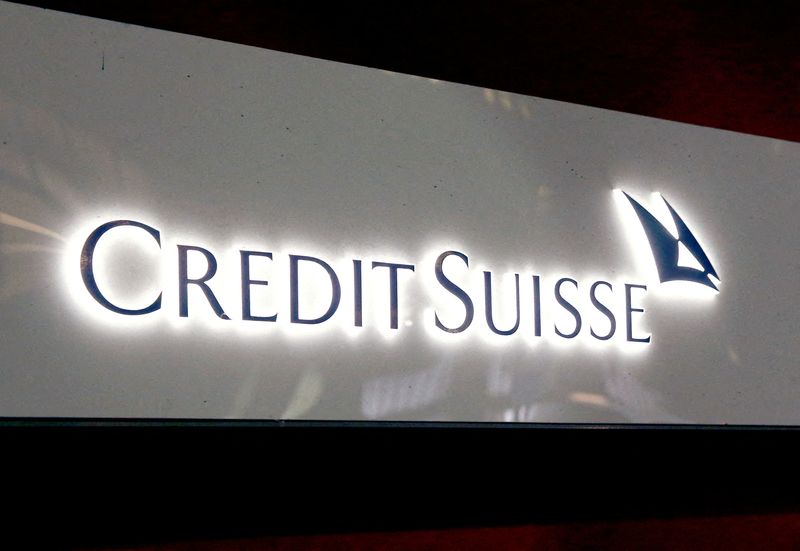ZURICH (Reuters) -Credit Suisse on Thursday capped a scandal-ridden year with a $2.2 billion quarterly loss and said 2022 earnings would be weighed down by restructuring and compensation costs.
Though Switzerland’s second-biggest bank had flagged a large fourth-quarter loss, it was still steeper than expected.
Analysts pointed to slides in revenue across most of its business segments, in addition to hefty legal costs for its investment bank, while many of its rivals have posted robust results.
Credit Suisse also flagged a decline in adjusted pretax income for the first quarter. The bank’s shares, which have lost just over a third of their value since the start of 2020, slid 5.6% by early afternoon trade.
“We see no reason to recommend bets in Credit Suisse securities,” ZKB analyst Michael Kunz said after the results.
Credit Suisse’s horrendous 2021 was marked by the collapse of $10 billion in supply chain finance funds linked to insolvent British finance firm Greensill and a $5.5 billion trading loss from the implosion of investment fund Archegos, both in March.
Net income attributable to shareholders for the year tumbled to a 1.6 billion franc loss versus a profit of 2.7 billion in 2020.
CEO Thomas Gottstein said the bank was actively working on resolving legacy issues, noting a goodwill impairment charge relating to its acquisition of U.S. investment bank Donaldson, Lufkin & Jenrette (DLJ) in 2000.
Noting a major scaling back of its risk appetite following the twin hits in March, which prompted a series of sackings, investigations and a strategic overhaul, Gottstein said the bank’s business had been hampered as it focused on remediation efforts and addressed further legacy matters.
“We were a bank, which just embarked on a new organisational structure and had become very inward focused, especially in December. This all negatively impacted our franchise momentum,” Gottstein told journalists on a call, regarding challenges the bank faced in the fourth quarter, adding steps to turn business around remained ongoing.
“This will not be a quick fix, and we expect 2022 will be a transition year, but we have made clear progress in creating the conditions for a much more stable and predictable bank,” he said.
Last year’s scandals, preceded by an executive spying scandal in 2019, have only been followed by more. It began 2022 with the abrupt departure https://www.reuters.com/business/finance/credit-suisse-faces-money-laundering-charges-trial-bulgarian-cocaine-traffickers-2022-02-07 last month of its chairman brought in just nine months earlier and has become the first major Swiss bank to be tried in a criminal court https://www.reuters.com/business/finance/credit-suisse-faces-money-laundering-charges-trial-bulgarian-cocaine-traffickers-2022-02-07, charged with allowing an alleged Bulgarian cocaine trafficking gang to launder millions of euros.
Credit Suisse has denied wrongdoing in the Bulgarian case.
Tasked with reforming the bank’s freewheeling corporate culture, Chairman Axel Lehmann has said he wants to stick with his predecessor’s strategy of focusing on wealth management, noting customer business remained excellent at the time of his appointment in January.
During the final quarter of 2021, Credit Suisse’s investment banking division posted a 2.1 billion-franc pretax loss. The goodwill impairment for DLJ came to $1.7 billion.
Fixed income and sales & trading revenue tumbled 38% year on year while equity sales & trading revenues slid 26% as a result of the bank’s exit from prime services announced in November. Capital markets revenue plunged 48%, while advisory revenue surged 51%.
Credit Suisse’s flagship international wealth management business saw revenue fall 26%. It noted it had seen new net asset outflows of $3.2 billion in its separate Asia Pacific division, which it said were related to wealthy clients deleveraging as well as “de-risking measures” it had taken.
For the full year, inflows fell across all of its divisions, while its international wealth management division saw outflows of 1.1 billion francs.
The bank experienced substantial outflows related to the severing of private banking and investment banking ties with SoftBank and its founder Masayoshi Son, a source familiar with the matter told Reuters, following a dispute https://www.reuters.com/article/us-credit-suisse-gp-softbank-group-idUSKCN24L26V over https://www.reuters.com/markets/europe/credit-suisse-may-take-legal-action-against-softbank-over-greensill-debt-court-2021-12-24 the Greensill-linked funds.
The bank conducted a compliance review which also led to it severing ties with some other private banking clients, the person said.
It is now in the process of reorganising its wealth management business as a single unit under Francesco de Ferrari https://www.reuters.com/business/credit-suisse-announces-new-members-exec-board-2021-12-13, who re-joined this year.
The bank was now looking to move through a difficult phase and rebuild momentum in its asset gathering “with the right risk appetite and right compliance processes”, the person said.
Across the bank, assets under management rose 7% to 1.6 trillion Swiss francs, helped by a pickup in inflows for its asset management business.
The bank maintained its dividend at 0.10 francs per share.
In a surprise move, it said it did not plan to publish an internal report on the Greensill debacle.
The results contrast with those of rival UBS in particular, which reported its best annual profit since the global financial crisis, prompting it to hike share buybacks and its profit goals.
($1 = 0.9242 Swiss francs)
(Reporting by Brenna Hughes Neghaiwi; Additional reporting by Michael Shields and Oliver Hirt; editing by Edwina Gibbs and Jason Neely)

























